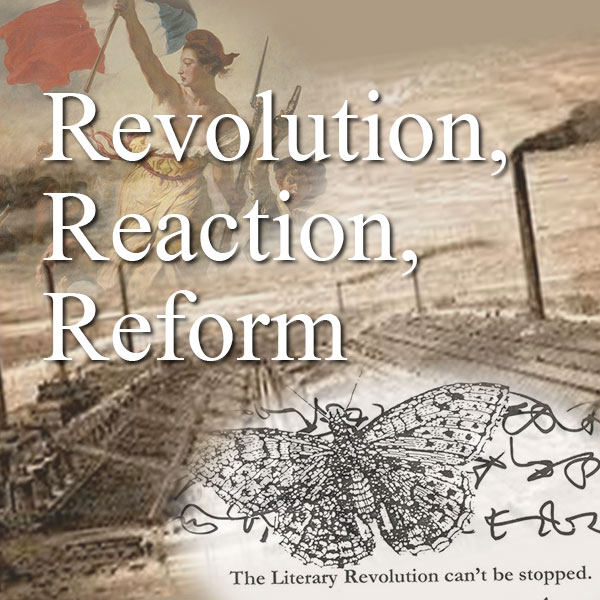MSSU ENG272 - Fall 2021 Dashboard
Description
 British Literature II: Revolution, Reaction, Reform examines British literature from the late eighteenth century to the present, a period that witnessed the American and French Revolutions, slave revolts such as the Haitian Revolution, a “revolution in female manners,” the Industrial Revolution, the twentieth-century revolutionary wave in Europe, as well as World War I and World War II, and, of course, artistic revolutions. We will consider how the authors and literary works of this period might be reacting to change, advocating for reform, or participating in literary revolutions—whether revolution is understood in the sense of “revolving” or of “revolting,” going full circle to return to a previous (more perfect?) time or experiencing/effecting a great alteration or rupture.
British Literature II: Revolution, Reaction, Reform examines British literature from the late eighteenth century to the present, a period that witnessed the American and French Revolutions, slave revolts such as the Haitian Revolution, a “revolution in female manners,” the Industrial Revolution, the twentieth-century revolutionary wave in Europe, as well as World War I and World War II, and, of course, artistic revolutions. We will consider how the authors and literary works of this period might be reacting to change, advocating for reform, or participating in literary revolutions—whether revolution is understood in the sense of “revolving” or of “revolting,” going full circle to return to a previous (more perfect?) time or experiencing/effecting a great alteration or rupture.
We'll be using the following texts at COVE Studio in the anthology British Literature II (MSSU), Fall 2021:
William Wordsworth, "We Are Seven"
William Wordsworth, "Tintern Abbey"
William Wordsworth, "I wandered lonely as a cloud"
Samuel Taylor Coleridge, "The Eolian Harp"
Samuel Taylor Coleridge, "This Lime-Tree Bower My Prison"
Samuel Taylor Coleridge, "Metrical Feet"
Robert Browning, "Porphyria's Lover"
Robert Browning, "Soliloquy of the Spanish Cloister"
Robert Browning, "My Last Duchess"
Alfred, Lord Tennyson, "Lady of Shalott"
Alfred, Lord Tennyson, "The Charge of the Light Brigade"
Thomas Hood, "The Song of the Shirt"
Elizabeth Barrett Browning, "The Cry of the Children"
Rupert Brooke, "The Soldier"
Virginia Woolf, "The Mark on the Wall"
T. S. Eliot, "The Love Song of J. Alfred Prufrock"
W. H. Auden, "Musée des Beaux Arts"
Dylan Thomas, "Do Not Go Gentle into That Good Night"
The digital edition of North and South for the map project can be found here:
Galleries, Timelines, and Maps
There is no content in this group.
Individual Entries
Robert Burns was an amazing poet. He wrote many pieces that involved love and heartache. When he died we lost a valuable poet. According to the website Find a grave:
Poet. Born the eldest of seven children at Alloway, near Ayr, the son of William Burnes, a small farmer and gardener for the Provost of Ayr. Burns was educated briefly at John Murdoch's school in Alloway but received most of his schooling at home. His first love, Nelly Kirkpatrick inspired him to try his hand at poetry, and he wrote a song entitled "O, once I lov'd a bonnie lass", and set it to the tune of a traditional reel. In 1783 he started composing poetry in a traditional style using the Ayrshire dialect of Lowland Scots. When his father died in 1784, Burns and his brother Gilbert rented a farm near Mauchline where they struggled to make a...
Darwin Island is one of the smallest islands in the Galápagos Archipelago, named for Charles Darwin because of his signifigant scientific discoveries in the Galápagos. Charles Darwin, originally from Shrewsbury, England, voyaged to the Galápagos Islands on the H.M.S. Beagle in the year 1831, where he invesigated both the geology and zoology of the area until the year 1836. Darwin journeled his findings of fossils, diversity of the land around him and the variation of species in the area throughout the five years he was exploring South America and the surrounding area. Darwin began writing his theory in the early 1840s, but sped up his writing process when he heard of a different scientist who planned to report on some of the same topics as himself. Darwin published On the Origin of Species by Means of Natural Selection in 1848, despite worries on how the book would be percieved by the public.
Darwin Island was originally known as Culpepper Island, after a famous...
moreThe city from which Jean-Jaques Dessalines declared Haiti's independance from France on January 1st, 1804. Although Dessalines would go on to massacre the remaining Europeans in the country and establish a system of forced servitude for the freed slaves, the announcement of independance was the first indication of sovereignty by any Latin American state. It was the only successful slave rebellion in history, and it inspired much discussion relating to the abolition of slavery in the rest of the world. Three years after the success of the Haitian Revolution, King George III ended the slave trade in England, marking one of the first steps towards total abolition.
"Haiti (Saint-Domingue)." Slavery and Remembrance, https://slaveryandremembrance.org/articles/article/?id=A0111.
Henry, Natasha L. "Slavery Abolition Act." Britannica, June 16, 2016,...
more